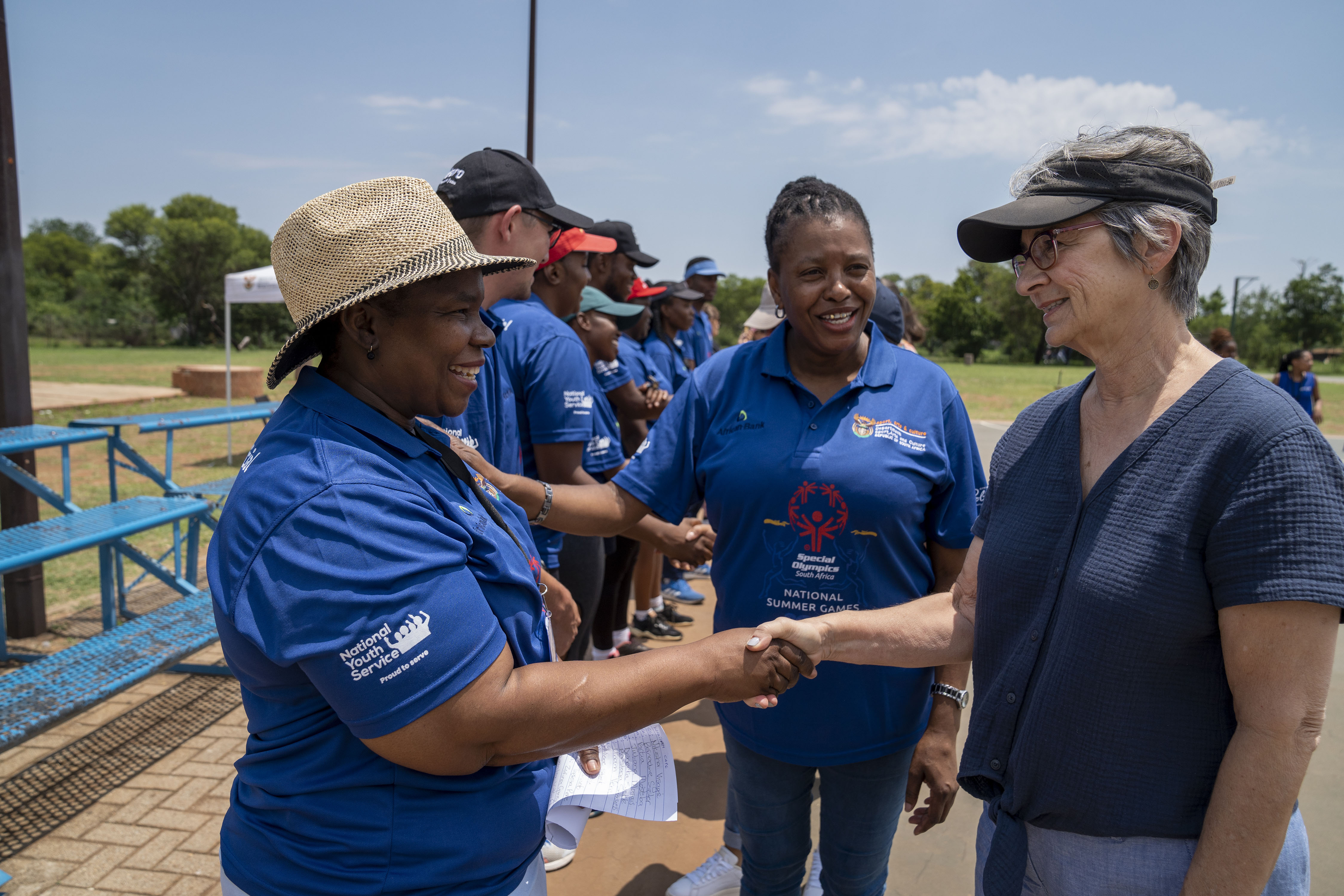

POLOKWANE, LIMPOPO – November 17-19, 2022 – Ann Costello, the Golisano Foundation Executive Director, visted this year’s Special Olympics South Africa National Games to witness the impact Tom Golisano's and the Golisano Foundation's global gifts have made on community health care for people with intellectual disabilities in South Africa.
Tom Golisano and the Golisano Foundation have partnered with Special Olympics International on Healthy Communities, a global initiative on inclusive health, contributing more than $67 million over the past 10 years.
Special Olympics South Africa was one of the first pilot sites in the world when Healthy Communities was launched in 2012.
Video: Day 1 Special Olympics South Africa National Games and Healthy Athletes 2022 in Limpopo"People with intellectual and developmental disabilities around the world have been marginalized for generations - provided poor access to social, educational, and medical services. Preventable health conditions including hypertension, diabetes, dental decay, and uncorrected vision are far worse than that of the general population," said Costello. "We partner with Special Olympics because they work to improve the health of people with intellectual disabilities by delivering preventive care, health screenings, training health professionals and strengthening health systems in over 100 countries. For more than a decade, we have worked together to close the gap in access to quality care and ensure a truly inclusive world for people with intellectual disabilities."
During the 2022 Special Olympics South Africa National Games, more than 700 athletes with and without intellectual disabilities from across all nine provinces will compete. These competitions will determine which athletes advance to the 2023 Special Olympics World Games in Berlin, Germany. Over three days of events, competition will take place in nine sports: Athletics, Aquatics, Basketball, Bocce, Bowling, Football, Futsal, Netball and Table Tennis.
Health screenings - a program called Healthy Athletes - will be available free of charge to all athletes participating in the National Games. Health care professionals from seven disciplines will provide physical exams, vision, hearing, dental, nutrition, physiotherapy and podiatry screenings. Athletes are then referred for follow up care as needed, sometimes with urgent unmet medical needs. Special Olympics data shows that for every ten Special Olympics athletes:
Trained health care professionals that participate in Special Olympics Healthy Athletes programming report improved awareness and self-efficacy in providing care for and communicating with patients with intellectual disabilities. When athletes have referrals for follow-up care, these trainees are instrumental in both providing and facilitating treatment from their own practices or their professional networks.
“Successful and sustainable community partnerships, coupled with the power of human compassion, can usher in a world of health equity for those with intellectual disabilities. We partner with Special Olympics because we both see the urgent need for more partners from the government, the private sector and philanthropy to step in and help us realize this global vision,” added Costello.
“Special Olympics South Africa has provided around 30 000 free Healthy Athletes screenings since 2004, through the support of passionate health care professionals, local businesses and community health care structures,” said Ancilla Smith, CEO of Special Olympics South Africa. “The need is huge – we have 50,000 registered athletes but there are around 1.2 million children and adults with intellectual disabilities in South Africa. The gift from Golisano Foundation makes the training of more health care professionals, and the provision of more screenings, possible so that we can grow our network and reach at the local level.”
Special Olympics South Africa and the Department of Health in Limpopo are collaborating on the Healthy Athletes screenings, and a large-scale training event of 65 health professionals in the Limpopo province will take place during the Games from 17 –19 November. These trainees will then commit to volunteering with Special Olympics for future screening events.
As part of the Golisano Foundation’s site visit of the local work in South Africa, Ann Costello visited the Fulufhelo Special School in Thohoyandou, Vhembe District. Out of the 190 countries in which the gift from Golisano Foundation is implemented, the innovative approach of Special Olympics Healthy Communities work in this setting during the COVID-19 shutdown attracted special notice. Over 700 athletes have been screened, as well as Young Athletes programming in early childhood development and support from Miss South Africa with a mental wellness drive.
A pilot site for Healthy Communities in 2012, Special Olympics South Africa has continued to sustain and strengthen Healthy Communities over the past ten years, partnering with organizations such as Gift of the Givers. During the pandemic, they have hosted webinars and virtual Family Health Forums emphasizing COVID-19 prevention, nutrition, fitness, and mental wellness. Special Olympics South Africa has procured a mobile health clinic with support from the government of Japan and has forged relationships with healthcare facilities to provide health care to people with intellectual disabilities.
As of 2022, Special Olympics South Africa has 3,700 athletes participating in in-person fitness activities and has recruited 4,000 paid athlete interns trained to implement SOFit programming in hundreds of schools nationwide. They have trained 99 athlete Health Messengers and provided preventative health education to 8,000 individuals. University partners this year include the Universities of Cape Town, Limpopo, Venda, Johannesburg and Pretoria. and in this sentence 30,000: “Special Olympics South Africa has provided around 30,000 free Healthy Athletes screenings since 2004, through the support of passionate health care professionals, local businesses and community health care structures,” said Ancilla Smith, CEO of Special Olympics South Africa.###
Special Olympics Inclusive Health
[ Back to News ]